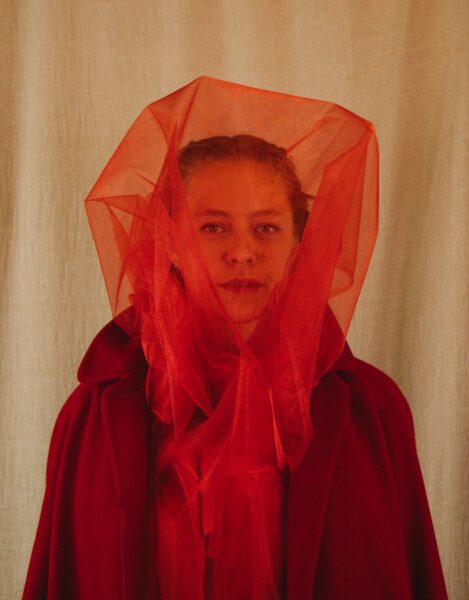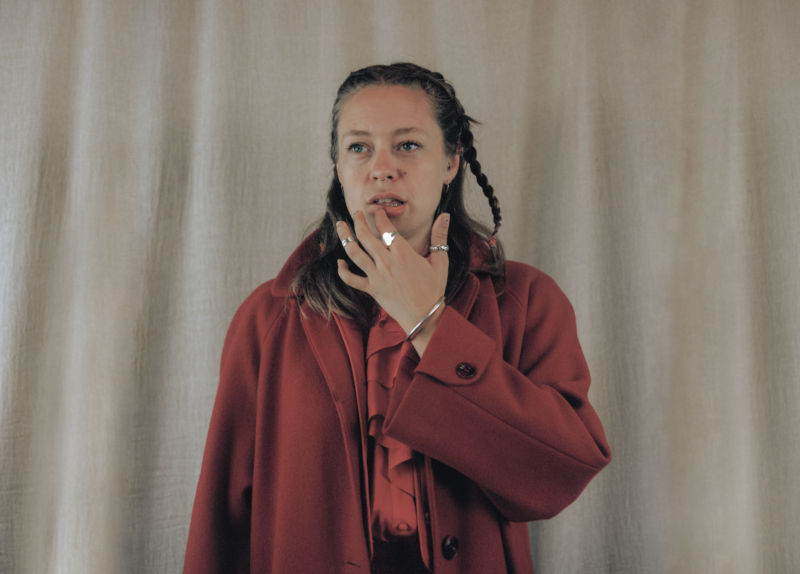With her second album in|FLUX, Anna B Savage delves deep into the duality of the human experience. She continues a journey that commenced on her first album A Common Turn, evolving personally and liberating herself musically while doing so. NBHAP editor Felicia sat down with the London native on a February afternoon to talk about therapy, creating art by unlearning, and the color red.
A Transformed Continuation
 Where on A Common Turn Anna B Savage took audiences along on her search for answers to life’s maze of questions, on in|FLUX the singer is now more comfortable with contradiction and ambiguity occupying the same space. Her music exists somewhere between folk, singer-songwriter indie, and spoken word, remaining deeply intimate and accessible. The themes range from love and pleasure to loss and pain and the evidence of each in the other. To find the courage to be vulnerable and explore these emotions out in the open, Savage describes how it took a tremendous amount of effort and a change in attitude to get to this place:
Where on A Common Turn Anna B Savage took audiences along on her search for answers to life’s maze of questions, on in|FLUX the singer is now more comfortable with contradiction and ambiguity occupying the same space. Her music exists somewhere between folk, singer-songwriter indie, and spoken word, remaining deeply intimate and accessible. The themes range from love and pleasure to loss and pain and the evidence of each in the other. To find the courage to be vulnerable and explore these emotions out in the open, Savage describes how it took a tremendous amount of effort and a change in attitude to get to this place:
“It feels a lot better to not be as precious about it. That feels like an important lesson that I learned and a development I’ve made. I don’t feel as ashamed […] about it anymore and I keep reminding myself it’s a process of trusting myself. Trusting that stuff would come out and that I would be able to do it and that me and Mike [Lindsay] would bring this stuff out, as well.”
To get to this change in perspective, Savage emphasizes how therapy and new approaches in creating art opened new possibilities for her to engage with herself and her music. Aging and therapy played a key role in this development and were part of the same thing for her. In conjunction, it helped her to understand and forgive herself. “I am not as cruel on myself as I used to be”, the singer says. It allowed her to feel contradicting things without judging herself or acknowledging judgment from others.
“Music is not my only love. […] Allowing myself to do these things as well and not feeling guilt for not working on my career. […] I’ve done many things. I’ve worked in toy shops, I’ve worked with plants, in graphic design. […] Lots of things. And many years later I can see how they all fit in, and I can see why they were all important, whereas at the time people were saying you were doing so many different things, you’re not focusing.”
This change in attitude is very tangible on the lead single in|FLUX. Savage’s rise in self-confidence and the things she wants to pursue, no matter her surroundings, is embodied in the song’s repeating lines: “I want to be alone| I’m happy on my own| Believe me”. This is juxtaposed with the swelling music until culminating in a wonderfully energetic and chaotic cry and laughter, signaling the connection between the two seemingly opposite emotions.
“’[in|FLUX] exemplifies the ‘flux’ as I see it between two seemingly disparate parts of me, my music, my mind, and my creativity. The first half is a close, vulnerable, and quiet start, full of introspection, vulnerabilities, and a stilted inability to express something. From there, the song unfurls into a second half that is more certain, more vocal, and expressive of self-assuredness. These feel like two states (along with everything in between, as well) that I inhabit simultaneously as dynamic and multifaceted emotional human.”
Unlearning
Through the collaboration with producer Mike Lindsay, Savage emphasized how the writing process for this album had evolved. For A Common Turn, the artist would enter the studio with her previously written material, at which point producer Will Doyle would come in and give additional input. Savage thoroughly enjoyed this collaborative exchange on her first record, even though initial anxiety and frustration accompanied her in its writing process.
“Writing my first album, […] I was so shy of people hearing me fuck up, that I didn’t want anyone to be anywhere near where I was trying to write songs. […] I was really shutting everything out and if it wasn’t that perfect environment where I couldn’t hear anyone else, no one could hear me, if it wasn’t that then I couldn’t write. I really did the opposite for [in|FLUX].”
The process for in|FLUX instead involved the album’s producer Mike Lindsay right from the start. “Working with anyone who you haven’t worked with before always brings out something new in you”, Savage says. It rings especially true in a big part of Lindsay’s influence being the practice of unlearning. Before coming into the recording sessions, Savage would write down her ‘Morning Pages’, a popular practice of meditative writing from The Artist’s Way (1992) by Julia Cameron. It consists of writing down three pages of uninterrupted, uncategorized streams of consciousness first thing in the morning to clear the artist’s head. The practice aims at dropping inhibitions once learned and instead relies on trust in one’s instincts. This allowed a great amount of fluidity in interaction-based writing and recording.
Things at Once
A result of these free exchanges is the depth of themes explored on the record. The album bursts with the multi-layered interplay and overlapping of emotions, powerfully accentuated through Savage’s use of spoken word, lending a touching level of immediacy to the listeners’ ear. From animalistic lust in Pavlov’s Dog, fittingly backed by panting noises to underscore the Pavlovian inspiration as a symbol for the primal reaction and longing we can have for our partners. To desire and insecurity in Crown Shyness, where the shy, first steps between potential lovers are compared to the observed phenomenon of fully formed tree crowns leaving just enough space between each other, never touching but reaching, giving a beautiful visual to this very delicate state of a relationship.
A highlight for me is the soft and desperately inquiring Say My Name, in which Savage is pleading for someone to acknowledge her anguished state and offer salvation. With Feet of Clay Savage demonstrates her awareness of conflicting desires you can have or changing feelings you’ve expressed for someone. She sings: “I know I said I wanted you, but I’ve got feet of clay | I know I said I wanted you but that was yesterday”.
“I Wanna Feel Powerful”
Anna B Savage may deal with similar issues on in|FLUX as on her first album but the heightened agency and increased self-confidence put her into a more powerful position. To visualize this change, Savage decided to adhere to a new color scheme. Where it felt natural for A Common Turn to embrace a dark, inky blue and center visuals around “nature and tactility, and the conversation between the two”, it felt just as natural to turn to a bright red and orange for in|FLUX. These colors symbolize the “empowerdfulness” Savage experienced writing this album. The visuals lean heavily towards surrealism, abstraction, and the contrasting force of red and orange to darkness and nature. This deliberate juxtaposition represents Savage’s journey, her maturing to pursue her urges and curiosities, no matter the surroundings.
Moreover, it offers a way to show vulnerability. In the first longer visuals for the in|FLUX era, the music video for The Ghost, Savage’s face is covered with orange-red tulle, soaked in liquid, simultaneously hampering, and enhancing every facial expression made by the artists. Savage wears a light-orange hooded ensemble that evokes the image of raw flesh. Throughout the video, close-ups of Savage’s face and parts of her body show centipedes crawling over her, leaving an uneasy sensation. These impressions underline the song’s theme of quiet turmoil within when realizing that you still feel some kind of attachment to someone you thought you left behind a long time ago. Now, that someone has come back to haunt you and you don’t quite know what to do with these remnants of former feelings.
A story of loss and love, The Ghost highlights Savage’s forte to engage with her own vulnerability without sinking into self-misery but accepting the contradicting feelings because “two things can exist at the same time, and it doesn’t make them wrong, and it doesn’t make me bad. It just means that that is life.”
in|FLUX is out now via City Slang.



